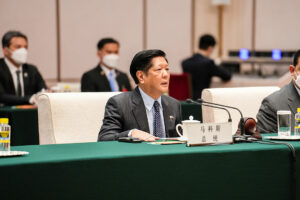PHILIPPINE President Ferdinand R. Marcos, Jr. on Wednesday vowed to improve ties with China and explore more areas of economic cooperation in the post-coronavirus pandemic era.
Mr. Marcos made the commitment at a meeting with Li Zhanshu, chairman of the Standing Committee of the National People’s Congress, which is equivalent to the Philippine Legislature.
During the meeting at the Great Hall of the People in Beijing, Mr. Marcos “stated the need to raise the level of cooperation between China and the Philippines, particularly as the world recovers from the coronavirus pandemic,” the Office of the Press Secretary said in a statement.
“I have always stated that the partnerships between them in the next few years will be partnerships that will stabilize and strengthen all our economies so that we are able to face challenges and the different shocks that we are now beginning to feel and will continue to feel in the next few years,” Mr. Marcos said during the meeting, based on a video posted by the Radio Television Malacañang (RTVM) on Facebook.
“Certainly, we have considered in the Philippines as of primary importance to increase the relationship and to strengthen the relationship between China and the Philippines,” he added.
Mr. Marcos said he wanted China to continue investing in the Philippines, “noting that although there are some disagreements, the two countries must not allow them to be the sum of their relationship,” the palace said.
“President Marcos wants the Philippine-China relationship to extend to commerce, culture, education, trade and investment, as well as to people-to-people exchanges,” it added.
Pampanga Rep. and former President Gloria Macapagal Arroyo, who has backed the previous administration’s friendly relations with China against the backdrop of their South China Sea dispute, and Speaker Ferdinand Martin G. Romualdez were present at the gathering.
Foreign Affairs Secretary Jose Enrique A. Manalo, Finance Secretary Benjamin E. Diokno, Trade Secretary Alfredo E, Pascual, Socioeconomic Planning Secretary Arsenio S. Balisacan and First Lady Liza Araneta-Marcos were also present.
Mr. Marcos was set to meet with Chinese President Xi Jinping later in the day, where at least 10 agreements covering tourism, agriculture, trade and investments, among other things, were expected to be signed.
During the three-day state visit, the Philippines is expected to receive a 1.5-billion renminbi (P12 billion) grant from China, which accounted for 19% of the global economy in 2022 in terms of purchasing power parity.
Some Filipino foreign policy experts view the meeting between Mr. Marcos and Chinese President Xi Jinping with skepticism, citing China’s failure to deliver on its investment promises to the previous administration.
China claims more than 80% of the South China Sea, which is believed to contain massive oil and gas deposits and through which billions of dollars in trade passes each year. It has ignored a 2016 ruling by a United Nations-backed arbitration court that voided its claim based on a 1940s map.
The Philippines, which is being backed by the United States and its allies in ensuring freedom of navigation in the South China Sea, has been unable to enforce the ruling and has since filed hundreds of protests over what it calls encroachment and harassment by China’s coast guard and its vast fishing fleet.
In November last year, US Vice President Kamala Harris visited the Philippine island of Palawan near the disputed waterway as part of a three-day trip to an Asian ally that is key to America’s bid to counter China’s expansive activities in the region.
Analysts have said the US, the world’s largest economy, would likely remain as the Philippines’ No. 1 security ally under the Marcos administration after it made available $100 million in foreign military financing to Manila.
They also cited the “resurrection” of the Enhanced Defense Cooperation Agreement (EDCA), which allows the US military to operate in agreed locations in the Philippines on a rotational basis.
The Department of National Defense said last year $66.5 million had been earmarked for the approved EDCA projects. — Kyle Aristophere T. Atienza
